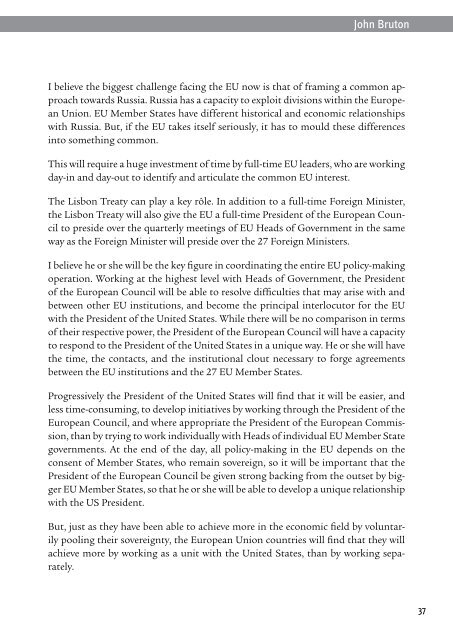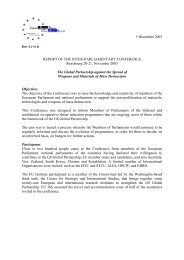The Obama Moment. European and American Perspectives
The Obama Moment. European and American Perspectives
The Obama Moment. European and American Perspectives
You also want an ePaper? Increase the reach of your titles
YUMPU automatically turns print PDFs into web optimized ePapers that Google loves.
John Bruton<br />
I believe the biggest challenge facing the EU now is that of framing a common approach<br />
towards Russia. Russia has a capacity to exploit divisions within the <strong>European</strong><br />
Union. EU Member States have different historical <strong>and</strong> economic relationships<br />
with Russia. But, if the EU takes itself seriously, it has to mould these differences<br />
into something common.<br />
This will require a huge investment of time by full-time EU leaders, who are working<br />
day-in <strong>and</strong> day-out to identify <strong>and</strong> articulate the common EU interest.<br />
<strong>The</strong> Lisbon Treaty can play a key rôle. In addition to a full-time Foreign Minister,<br />
the Lisbon Treaty will also give the EU a full-time President of the <strong>European</strong> Council<br />
to preside over the quarterly meetings of EU Heads of Government in the same<br />
way as the Foreign Minister will preside over the 27 Foreign Ministers.<br />
I believe he or she will be the key figure in coordinating the entire EU policy-making<br />
operation. Working at the highest level with Heads of Government, the President<br />
of the <strong>European</strong> Council will be able to resolve difficulties that may arise with <strong>and</strong><br />
between other EU institutions, <strong>and</strong> become the principal interlocutor for the EU<br />
with the President of the United States. While there will be no comparison in terms<br />
of their respective power, the President of the <strong>European</strong> Council will have a capacity<br />
to respond to the President of the United States in a unique way. He or she will have<br />
the time, the contacts, <strong>and</strong> the institutional clout necessary to forge agreements<br />
between the EU institutions <strong>and</strong> the 27 EU Member States.<br />
Progressively the President of the United States will find that it will be easier, <strong>and</strong><br />
less time-consuming, to develop initiatives by working through the President of the<br />
<strong>European</strong> Council, <strong>and</strong> where appropriate the President of the <strong>European</strong> Commission,<br />
than by trying to work individually with Heads of individual EU Member State<br />
governments. At the end of the day, all policy-making in the EU depends on the<br />
consent of Member States, who remain sovereign, so it will be important that the<br />
President of the <strong>European</strong> Council be given strong backing from the outset by bigger<br />
EU Member States, so that he or she will be able to develop a unique relationship<br />
with the US President.<br />
But, just as they have been able to achieve more in the economic field by voluntarily<br />
pooling their sovereignty, the <strong>European</strong> Union countries will find that they will<br />
achieve more by working as a unit with the United States, than by working separately.<br />
37



